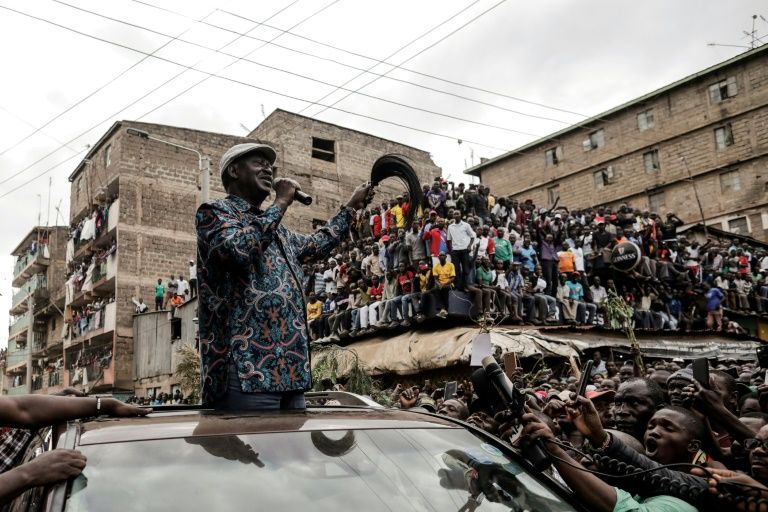Tuesday, August 15

“WE WILL NOT GIVE UP”
Kenya’s opposition leader to announce post-election strategy

Raila Odinga will announce his next move today after losing last Tuesday’s presidential election. The opposition leader insists the contest was rigged after incumbent Uhuru Kenyatta won 54% of the vote. Election observers dispute Odinga’s claim.
Odinga has been here before. This is the fourth election he’s lost since 1997. He’s challenged the last two; one in 2007—which was deemed fraudulent, leading to large-scale ethnic violence and a deal that made him prime minister—and one in 2013, which was dismissed by Kenya’s top court.
But this time, Odinga’s options are limited. Kenyatta’s victory margin is almost 4 percentage points larger than it was in 2013, so he’s unlikely to offer to share power.
The 72-year-old could call on supporters to foment civic unrest—indeed, he asked them to strike on Monday. But because regional and international leaders have already recognised Kenyatta’s victory, doing so will tarnish the opposition’s image. A legal challenge is the most likely ‘next move’, but the apparent lack of evidence means it would be quickly dismissed.
Expect bluster and determination in today’s announcement; ultimately Mr Odinga will have to accept the result or risk a return to ethnic violence.
NEW VOTING, SAME PROBLEMS
Brazilian lawmakers consider revamping electoral system

Brazil’s Chamber of Deputies votes on a political reform package today in an attempt to salvage the country’s political order as corruption investigations abound.
The reforms would set up a $1.2 billion election fund in a bid to stop the use of campaign contributions as kickbacks. The electoral system itself would be replaced with the new “distritao” system for the 2018 elections, in which votes would be allocated to individual candidates rather than to political parties.
Distritao has come under fire, with critics claiming it will merely allow corrupt leaders to entrench themselves in office through their higher name recognition. Proponents argue it is necessary to cut down on the bloated number of political parties in Congress, totalling 25 in the chamber. Small parties, naturally, are not pleased.
If the reform is passed, do not expect a new electoral system to rescue Congress in Brazilians’ eyes; only 3% say they have confidence in the legislature. That number is unlikely to improve if a new vote-counting method elects the same candidates.
PLAYING CATCH-UP
German candidates hit campaign trail ahead of September election

Angela Merkel continues her campaign in Bremen today ahead of the September 24 general election. Her main rival, Martin Schulz, will lay out his immigration platform in Berlin.
With Merkel’s centre-right Christian Democrat Union (CDU) leading Schulz’s centre-left Social Democratic Party by an average of 15 points in polls, the former European Parliament president needs a breakthrough if he hopes to unseat the incumbent. He may be hoping immigration could do the trick, having endorsed financial consequences for EU countries that don’t take their share of refugees.
Yet, without some major CDU misstep or an unforeseen event wrecking Merkel’s popularity, there is little Schulz can do to lift his party’s fortunes. While some speculate a scandal over collusion among auto firms could hurt the incumbent, Merkel opened the CDU campaign blasting German automakers and touting her economic record—including the 3.8% unemployment rate.
Expect Merkel to win a fourth term. The question is whether she continues the current grand coalition with Schulz’s party, or if the centrist Free Democratic Party or environmentalist Greens do well enough for the CDU to govern with one or both of them instead.
HAPPENING ELSEWHERE…

Egyptian President Abdel Fattah al-Sisi will begin a four-day tour of Sub-Saharan Africa today, beginning with 48 hours in Rwanda. Despite its small population and size, Rwanda has emerged as an important player when it comes to water politics. In May, Rwanda signed a memorandum of understanding on water resource management with Ethiopia, which wants to construct a $6 billion dam on the Nile River. Egypt—an upstream Nile country—has long opposed the dam’s construction and has lobbied regional countries to isolate Ethiopia. Sisi will need all the charm he can muster to change minds in Rwanda.
Republicans in Alabama will hold a primary to fill the Senate seat left open when Jeff Sessions was appointed attorney general. The leading contenders are Luther Strange—Alabama’s former attorney general and Sessions’ appointed replacement in the Senate—and Roy Moore, a former state supreme court chief justice who was suspended from his post for resisting the US Supreme Court’s ruling legalising same-sex marriage. Despite an apparent conflict over legislative norms, Donald Trump has given Mr Strange his “complete and total endorsement”. If, as is expected, none of the nine candidates secures a majority of votes, the top two will head for a runoff on September 26. The winner is likely to easily beat the Democratic challenger when Alabamians cast their final vote on December 12, though Strange would have an easier time of it than the controversial Mr Moore.
India will celebrate 70 years of independence from Britain. Prime Minister Narendra Modi will address the nation and has called on citizens to submit ideas for his speech address via an official mobile app. ‘Resolve’ is likely to be the central message of the day—New Delhi has instructed students around the country to recite a pledge to fight poverty, corruption, terror and discrimination as a show of patriotism.
Despite becoming independent on the same day, Pakistan celebrates its independence a day earlier—one of many differences between the two neighbours. President Mamnoon Hussain called on citizens to “unite under the constitution” during a ceremony in Islamabad on Monday. Pakistan has been rocked by the ousting of former Prime Minister Nawaz Sharif last month.
Preliminary figures to be announced today are expected to show Germany’s economy grew by 0.7% from April to June.
UK authorities will release inflation figures for July, which are expected to have increased marginally to 2.7% from 2.6% in June.

